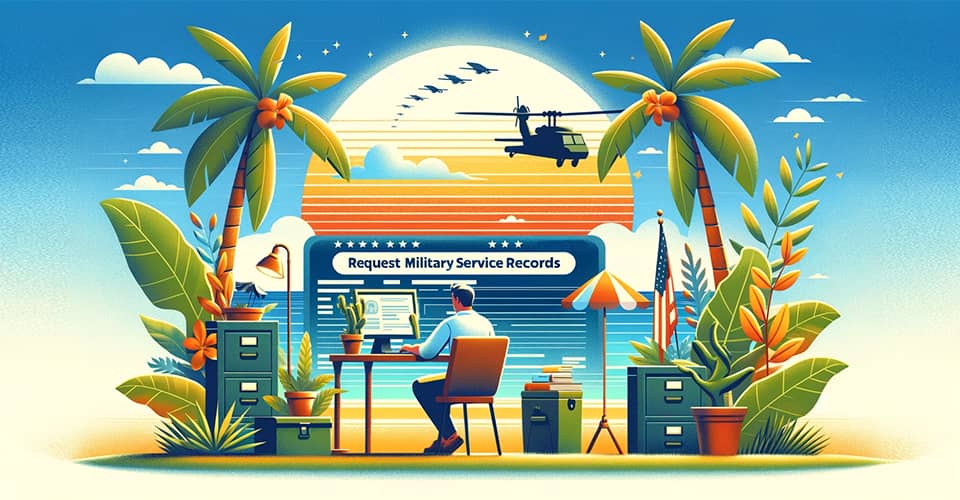How to Request Military Service Records for a VA Loan in 2024
This guide will walk you through how to easily get your military service papers, sometimes called "records."
How to Request Military Service Records
Requesting military service records is a critical step for veterans, their families, or researchers who seek to obtain valuable historical, personal, or legal information.
Whether you're looking to secure benefits, conduct genealogical research, or simply preserve a piece of personal history, knowing how to access these records is essential.
Below, we outline who can request these records, what records are available, and how to request them for free.
Who Can Request Records?
Military service records can be requested by veterans themselves or, if deceased, the next of kin.
The next of kin includes the surviving spouse that has not remarried, father, mother, son, daughter, sister, or brother of the deceased veteran.
Additionally, authorized representatives acting on behalf of the veteran or their next of kin can also request these records.
For research purposes, members of the general public may request certain information provided the veteran’s date of separation from military service was 62 years ago or more, as these records are then considered archival and are open to the public.
What Records Are Available?
DD Form 214 (Report of Separation)
The DD Form 214 is one of the most important documents available to veterans as it is a complete and verified record of a service member's time in the military, including their service dates, rank, and reason for discharge.
It's essential for accessing veteran benefits.
Other Military Service Records
Besides the DD Form 214, individuals can request various other military records, such as:
-
Military personnel files, which include documents related to the veteran's terms of service, training, awards, and disciplinary actions.
-
Medical and health records, detailing the veteran's medical history during their service.
- Unit histories and rosters, providing context on the veteran’s service environment.
How to Request Records for Free
To request military service records for free, follow these steps:
Determine the Type of Records Needed
First, clarify whether you need a copy of the DD Form 214, medical records, or other service documents. This will dictate how you proceed with your request.
Prepare Your Request
For veterans or next of kin, you can request records online using the eVetRecs system provided by the National Archives.
This system guides you through the process of requesting personnel records with an online form. Alternatively, you can mail or fax a Standard Form 180 (SF-180) to the National Personnel Records Center (NPRC).
For Archival Records
If the service ended 62 years ago or more, records are archival and are open to the public.
These can be requested online or through a written request without the need for a Standard Form 180. However, there may be reproduction fees for archival records.
Include Essential Information
Whether requesting online or via mail/fax, ensure to include all necessary details such as the veteran's full name, Social Security Number/Service Number, branch of service, and dates of service to expedite your request.
Submit Your Request
Once your request is prepared, submit it via the preferred method.
The NPRC operates without charge for most veteran’s service record requests, including shipping for mailed records.
By following these guidelines, you can navigate the process of obtaining military service records smoothly and ensure access to vital documents for benefits, historical research, or personal preservation.

What Information Do I Need for the Request?
When you're ready to request military service records, it's important to provide specific information to help locate the records accurately and efficiently.
This ensures that your request is processed smoothly and you receive the documents you're looking for.
For a successful request, make sure to include the following details:
-
The veteran's complete name used while in service: This is essential for identifying the correct record among potentially thousands with similar names.
-
Service number: A unique identifier for each service member.
-
Social Security number: Helps in further ensuring the accuracy of the records pulled.
-
Branch of service: Specifies the division of the military in which the veteran served, such as the Army, Navy, Air Force, Marine Corps, or Coast Guard.
-
Dates of service: The time period the veteran served, which is crucial for locating records from the correct era.
-
Date and place of birth: Especially important if the service number is unknown, as it can help distinguish between records.
-
For records possibly affected by the 1973 fire: Place of discharge, Last unit of assignment and Place of entry into the service, if known.
-
Signature and date: All requests must be signed and dated by the veteran or their next of kin to validate the request.
- Proof of death for deceased veterans: If you are the next of kin of a deceased veteran, include a copy of the death certificate, a letter from the funeral home, or a published obituary as proof of the veteran's death.
What is the National Archives and Records Administration (NARA)
The National Archives and Records Administration (NARA) is an important part of the U.S. government. It keeps and looks after government and historical records, including those related to the military.
Here's a simple breakdown of what NARA is and how it helps veterans and their families.
Think of NARA as the country's memory keeper. It holds onto all sorts of documents, like papers, photos, and maps, that tell the story of the United States, including the military service of veterans.
It's where the history of the military and the stories of millions of veterans are kept safe for future generations.
How Can NARA Help Veterans?
NARA is really useful for veterans, their families, and people looking into their family's military past. Here's what it can do:
Get Military Records
Veterans or their closest family members can ask NARA for copies of military service records.
These records are important for many reasons, such as getting veteran benefits, replacing lost medals, or researching family history.
These records include details about a veteran's service, health records, and more.
Replace Medals and Awards
If a veteran has lost or damaged their service medals or awards, they or their immediate family can request new ones through NARA.
This is a way to honor and remember the sacrifices and achievements of veterans.
Frequently Asked Questions
Got a question about your military service records? We've got answers! Here's a rundown of some of the most common questions veterans have.
Who can request military service records?
Generally, veterans themselves and their next of kin can request military service records.
What records are available?
Military service records can include your DD Form 214 (Report of Separation), details of your deployment history, awards and recognitions you received, and other documents related to your service.
How to request records for free?
If you separated from the military more than 62 years ago, you can request your records for free from the National Archives.
How to request records with a fee?
If you separated from the military less than 62 years ago, there is a fee associated with requesting your records. You can find information on fees and payment methods on the National Archives website.
How long does it typically take to get my records?
Processing times can vary, but it generally takes up to 90 days to receive your military service records after submitting your request.
What if my records aren't available online?
If your records aren't available online, you can still request them by mail or fax using the forms provided by the National Archives.
What if I need help requesting my records?
The National Archives offers resources and a dedicated phone line to assist veterans with requesting their service records. You can find this information on their website.
What happens if my records are lost or damaged?
Unfortunately, sometimes military service records can be lost or damaged. If you believe this might be the case, you can still submit a request to the National Archives.
They will try to locate your records or provide alternative solutions.
Is there anything else I can do to ensure my records are accurate?
While requesting your records is a good first step, it's also recommended to review them carefully for any inaccuracies. If you find any mistakes, you can contact the National Archives to initiate a correction process.
Bottom Line
Requesting military service records is an essential step for veterans and their families to access well-deserved benefits, conduct research, or preserve personal history.
The process, detailed by the National Archives and Records Administration (NARA), is designed to be straightforward and accessible, ensuring that veterans can easily obtain their DD Form 214, medical records, or other military service documents.
By providing necessary information and following the outlined steps, individuals can smoothly navigate the request process.
Whether for securing veteran benefits, replacing lost medals, or simply holding onto a piece of personal or family history, accessing military records is a valuable resource.
To explore how these records can benefit you and to learn more about making Florida your home, visit MakeFloridaYourHome for further assistance and information.
With over 50 years of mortgage industry experience, we are here to help you achieve the American dream of owning a home. We strive to provide the best education before, during, and after you buy a home. Our advice is based on experience with Phil Ganz and Team closing over One billion dollars and helping countless families.

About Author - Phil Ganz
Phil Ganz has over 20+ years of experience in the residential financing space. With over a billion dollars of funded loans, Phil helps homebuyers configure the perfect mortgage plan. Whether it's your first home, a complex multiple-property purchase, or anything in between, Phil has the experience to help you achieve your goals.


 By
By  Edited by
Edited by 






